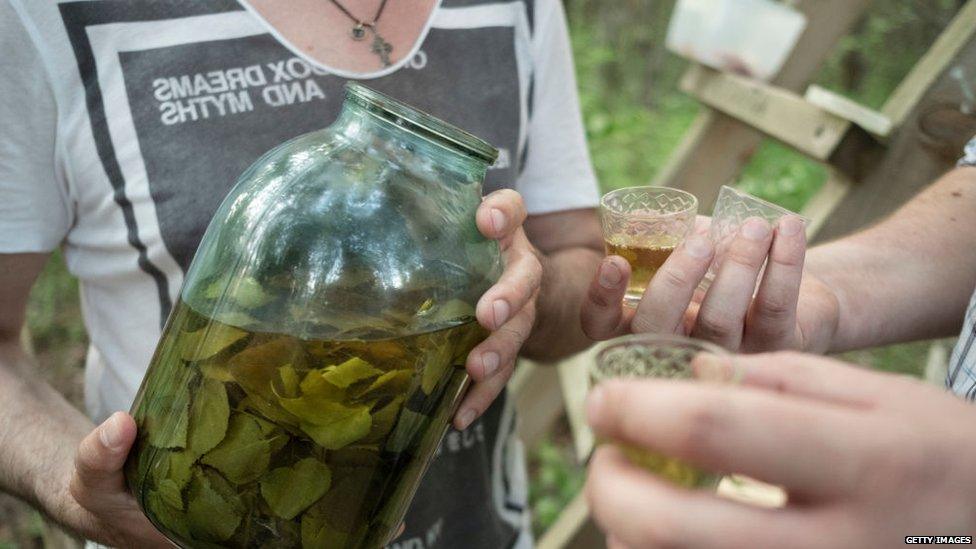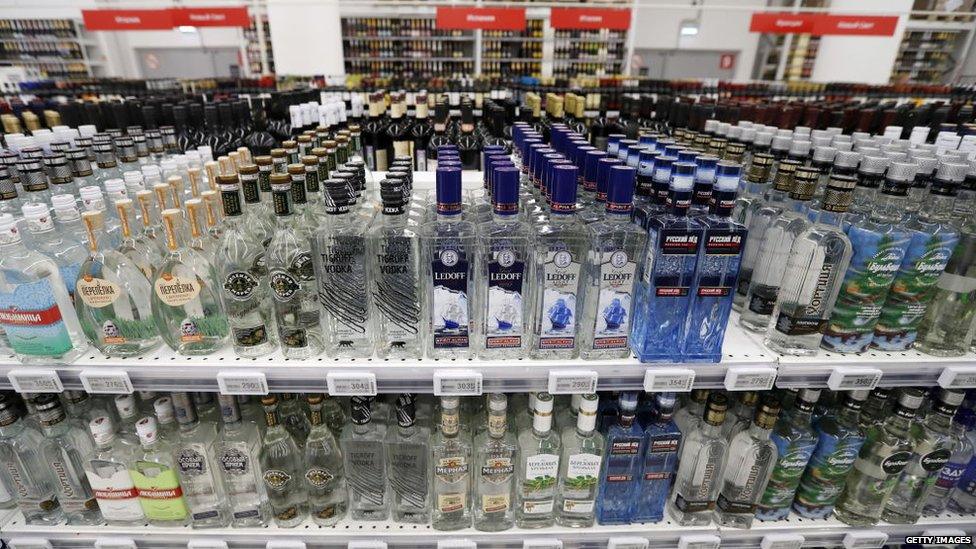Russian economists propose 'homebrew index'
- Published

More than 4,000 Russians died of alcohol poisoning in the first half of this year, according to official figures
A group of economists in Russia have suggested that the answer to forecasting future economic crises could lie in the country's cherished samogon, or illegal homebrew.
A team led by Alexei Zubets, a researcher at Moscow's Financial University, carried out a nationwide poll about drinking habits earlier this year, and discovered that people feeling the financial pinch tend to switch to homemade spirits or bootleg booze.
This shows that the introduction of a "samogon index" could provide the government with another way of monitoring economic performance, external, he told the official newspaper Rossiyskaya Gazeta, adding that the latest findings suggest things are already looking up.
"Our research shows that production of home-made alcohol and its trade volume in Russia have not increased in the last year. And there are a number of signs they are in decline. We'll most likely see real incomes grow in the coming months," Mr Zubets said.
'Barometer of economic prosperity'
The proposal has made waves among analysts of the sector. Some, like Vadim Drobiz of the Centre for Research of Federal and Regional Alcohol Markets, agree that alcohol could be used as a "barometer of economic prosperity".
But he suggests that an index based on the quantity of legal spirits sold in shops would be more useful.

Alcohol consumption in Russia is among the highest in the world
"If people have money to spend, they buy good-quality alcohol. In 2018-2019, sales of legal spirits increased, and that is proof that things aren't so bad, external in Russia," he told Rossiyskaya Gazeta.
But others, like leading sociologist Lev Gudkov, think the moonshine indicator would not predict anything not already known, external from existing methods.
"It is the same as many other social indicators, starting with socially-driven illnesses like alcoholism, heart diseases," he told the official RIA Novosti news agency.
'Self-contradictory idea'
Economist Oleg Chernozub describes the idea as "self-contradictory", and suggests that the relationship between samogon and economic prosperity is far more nuanced.
In advanced nations, he told RIA Novosti, homebrew production can be a sign of increased wealth, as people "have the time, desire and knowledge to do it".
You may also be interested in:
The ultra-conservative Tsargrad news site put its usual nationalist spin on the samogon index, dubbing it yet another example of "institutional Russophobia".
"These people really inhabit the classic myth of the eternal Russian drunkard, external unable to work to a high standard or understand proper language," it complained.
Tsagrad also agrees with Oleg Chernozub's argument from affluence, saying that "in wealthy Moscow, demand for equipment to make samogon and brew beer is very high".
Indeed, Prime Minister Dmitry Medvedev is said to be a homebrew aficionado, external who likes to give bottles of his own produce as presents to colleagues and foreign leaders, according to the Proyekt investigative website.
A 'scientific joke'
The criticism appears to have given Mr Zubets cold feet. He later recast his proposal as a matter of "scientists having fun", external.
But despite conceding that the idea was a "scientific joke", he insists that it could have some genuine uses, like helping the state budget to calculate revenue losses from the illegal production and sales of alcohol.
Reporting by Francis Scarr
Next story: 'Pyramids of shame' target Russian debtors
Use #NewsfromElsewhere to stay up-to-date with our reports via Twitter, external.